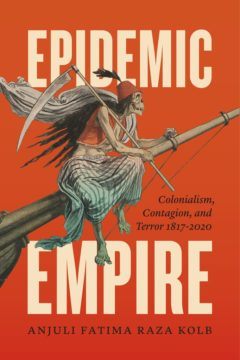Anne Schult at the Journal of the History of Ideas:
 Anne Schult: Over the course of the Covid-19 pandemic, reflections on contagious disease as allegory have abounded, and some of the most canonical texts engaging with this trope—from Susan Sontag’s Illness as Metaphor to Albert Camus’ The Plague—have regained popularity in public discourse as commentators are trying to make sense of the current public health crisis. In Epidemic Empire, you also draw on these (and many other) writings but place them at the very specific discursive nexus of epidemic, terror, and Islam. In doing so, you not only trace how disease has been used rhetorically to pathologize and dehumanize political resistance since the nineteenth century, but also expose the historical concurrency of insurgency and contagious disease in British India and their consequent stylization as inextricably related epistemological problems across the British, French, and American empires. What aspects that have hitherto remained hidden or obscured about the “epidemic imaginary” does this explicit focus on colonial, anticolonial, and postcolonial politics reveal, and how might these explain its continuous appeal?
Anne Schult: Over the course of the Covid-19 pandemic, reflections on contagious disease as allegory have abounded, and some of the most canonical texts engaging with this trope—from Susan Sontag’s Illness as Metaphor to Albert Camus’ The Plague—have regained popularity in public discourse as commentators are trying to make sense of the current public health crisis. In Epidemic Empire, you also draw on these (and many other) writings but place them at the very specific discursive nexus of epidemic, terror, and Islam. In doing so, you not only trace how disease has been used rhetorically to pathologize and dehumanize political resistance since the nineteenth century, but also expose the historical concurrency of insurgency and contagious disease in British India and their consequent stylization as inextricably related epistemological problems across the British, French, and American empires. What aspects that have hitherto remained hidden or obscured about the “epidemic imaginary” does this explicit focus on colonial, anticolonial, and postcolonial politics reveal, and how might these explain its continuous appeal?
Anjuli Fatima Raza Kolb: You’ve identified really carefully the process I unfold in the book: the way metaphors of disease— and in the story-length register, allegories of epidemic, like Camus’s—naturalize political violence along the lines of an earthquake, or an extinction event, as if they are part of earth’s in-built life cycle. In earlier imperial writings about nature and the natural world, you also see natural phenomena being described as revolutions, upheavals, or the violence of nature. Think Alexander von Humboldt, trained as a geologist for the purposes of mining, observing the earthquakes in the new world, or the term “rogue wave,” denoting a break in tide patterns but also connoting a vagrant or a beggar by way of the Latin rogare.For catastrophes and novel events—events we might call sublime, or at least out of the realm of the everyday—speakers of many languages use the tools of comparison to assist in sense-making.
More here.
